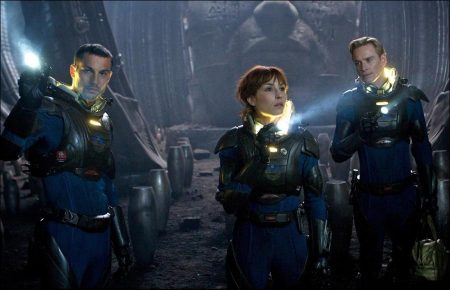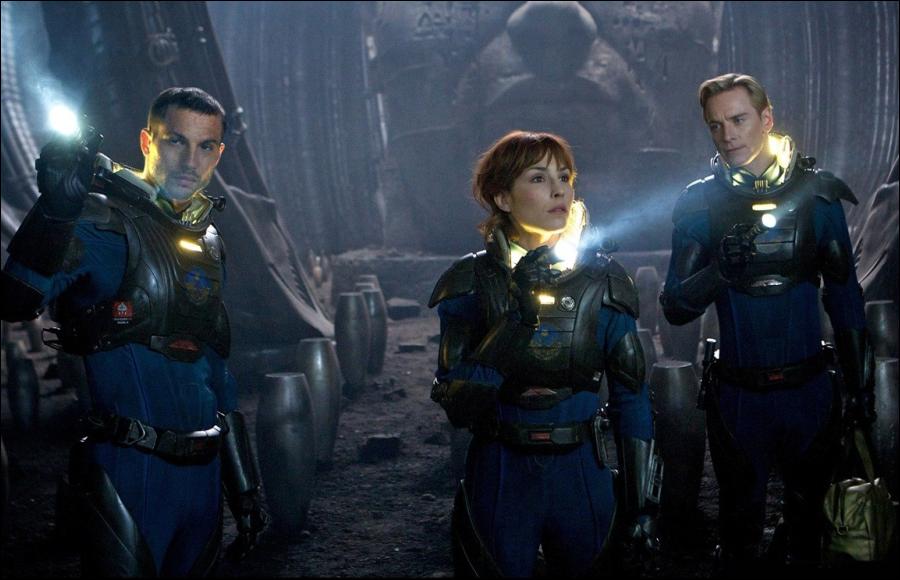Prometheus: Introducing a new mythology in spaceb Sir Ridley Scott, the renowned filmmaker who reinvented the science fiction film genre – having helmed Alien, a groundbreaking mix of science fiction and horror, followed by Blade Runner, one of the most revered and influential genre films of our time – offers his signature brand of action, thrills, scares, and much, much more, when Prometheus is unleashed in theaters worldwide this June.
With Prometheus, Scott has created a new mythology, in which a team of explorers discover a clue to the origins of mankind on Earth, leading them on a thrilling journey, aboard the spaceship Prometheus, to the darkest corners of the universe. There, they must fight a terrifying battle to save the future of the human race.
Although he has not helmed a science fiction picture in three decades, Ridley Scott’s interest in the genre never abated. Having made two of the most revered genre films of all time, his return would only be triggered by a truly grand idea. “Over the past few decades, we’ve been ‘action filmed-out’ and ‘monster filmed-out’ and almost ‘science fiction filmed-out,” says Scott. “So the baseline question is: how original are you going to be?”
“The reason I haven’t made another sci-fi film in so many years, apart from the fact I’ve been busy making other films and exploring different genres, is because frankly I haven’t come across anything worthwhile for me to do with enough truth, originality and strength. Prometheus has all three.”
The notion for Prometheus began with a figure glimpsed only briefly in Alien, and which seemed to be forgotten once the titular xenomorph burst, literally, onto the scene. But that mysterious being – a giant fossilized creature with a burst-open chest, which came to be known as the Space Jockey – was well remembered by the man who brought it to life. “Something that had stayed with me ever since Alien, was the mystery behind it,” says Scott. Who was he? Where was he from? What was his mission? What kind of technology would his kind possess? I thought those questions could provide a springboard for even larger ideas.”
So, yes, Prometheus began life years ago as an Alien prequel before evolving, as Scott puts it, “into another universe.” The film is engaged and defined by new ideas and questions that captured the filmmaker’s formidable imagination. Notes Scott: “Out of the creative process in developing the picture emerged a new, grand mythology, in which this original story takes place. The keen fan will recognize strands of Alien’s DNA, so to speak, but the ideas tackled in this film are unique, far-reaching and provocative. Prometheus is the singular genre tale I’d been searching for.”
Adds co-screenwriter Jon Spaihts: “The most difficult thing about writing this story was that nothing was given. Everything had to be invented. In creating an entire world with Ridley Scott, I had an enormous canvas to paint on.” And co-screenwriter / executive producer Damon Lindelof says that he was “incredibly struck by just how original Ridley’s vision was for this movie. It’s daring, visceral and hopefully, the last thing anyone expects.”
As the script was developed, the story’s big ideas emerged: During a journey to meet what some of the scientist crew believe to be their “makers” – beings who may have created life on our planet – the crew of the spaceship Prometheus and the mega-corporation funding its trillion-dollar mission, are in effect challenging the gods. And, as experienced by the Greek mythological figure from which the ship takes its name, challenging the gods can be a very, very bad idea.
“The film’s central metaphor is about the Greek Titan Prometheus, who defies the gods by giving humans the gift of fire, for which he is horribly punished,” Scott explains. “When you talk about the myth on which the title is based, you’re dealing with humankind’s relationship with the gods – the beings who created us – and what happens when we defy them.”
But ultimately, notes Lindelof, Prometheus is centered around… us. “It’s about humanity in the future, challenging some of our most cherished scientific and philosophic ideas.”
The team of scientists and explorers aboard the Prometheus are on nothing less than a journey to discover answers to some of life’s most profound questions. Two brilliant young scientists, Shaw (Noomi Rapace) and Holloway (Logan Marshall-Green) possessing contrasting motivations, lead the expedition. Shaw is a believer: she wants to meet these “gods” as a way of getting closer to her more traditional religious views, while Holloway is looking to debunk these kinds of spiritual notions. In their work as archeologists, they have discovered clues in cave pictograms from ancient civilizations across the world, all of which point to the same location in distant space, and have persuaded a corporation, Weyland Industries, to fund the mission.
Neither scientist was prepared for the unimaginable terrors they would encounter. “When Shaw and Holloway conceived the mission, their expectation was they would discover a benevolent species that might provide answers to some of our greatest mysteries,” says executive producer Michael Ellenberg. “In other words they were hoping to meet gods. But these beings prove to be anything but compassionate. They are a dangerous race of superbeings.”
“The crew of the Prometheus thinks they’re headed to paradise to discover answers to the ultimate questions. But what they find is a dark and twisted and frightening world – a way station for these beings,” adds Jon Spaihts. “The cold and implacable environment is more like hell than heaven.”
In Ridley Scott’s films, including Prometheus, the protagonists’ discoveries often defy expectations. “That’s what makes good drama,” states the filmmaker. “Our story circles the truth of what might be out there and therein lays its most frightening aspect. Feasibility always creates the finest and most dangerous drama and the opportunity for me to scare the hell out of everyone.”
On the planet, the team meets a survivor of a civilization in control of some very dangerous elements, including various forms of biology and biomechanics, which in a heartbeat can eviscerate its victim, or worse. “This brings us to the question,” says Scott, “what are the consequences of meeting a superior being, whose capabilities are quantum leaps beyond one’s own, and are in effect god-like?”
Or put another way: Maybe there are some things best left unexplored.
Related Link: View the Full Production Notes for Prometheus
Views: 125





